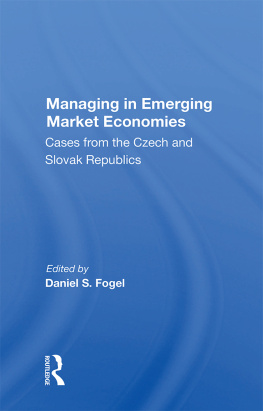Daniel S Fogel - Managing in Emerging Market Economies: Cases From the Czech and Slovak Republics
Here you can read online Daniel S Fogel - Managing in Emerging Market Economies: Cases From the Czech and Slovak Republics full text of the book (entire story) in english for free. Download pdf and epub, get meaning, cover and reviews about this ebook. year: 2020, publisher: Routledge, genre: Politics. Description of the work, (preface) as well as reviews are available. Best literature library LitArk.com created for fans of good reading and offers a wide selection of genres:
Romance novel
Science fiction
Adventure
Detective
Science
History
Home and family
Prose
Art
Politics
Computer
Non-fiction
Religion
Business
Children
Humor
Choose a favorite category and find really read worthwhile books. Enjoy immersion in the world of imagination, feel the emotions of the characters or learn something new for yourself, make an fascinating discovery.
- Book:Managing in Emerging Market Economies: Cases From the Czech and Slovak Republics
- Author:
- Publisher:Routledge
- Genre:
- Year:2020
- Rating:3 / 5
- Favourites:Add to favourites
- Your mark:
- 60
- 1
- 2
- 3
- 4
- 5
Managing in Emerging Market Economies: Cases From the Czech and Slovak Republics: summary, description and annotation
We offer to read an annotation, description, summary or preface (depends on what the author of the book "Managing in Emerging Market Economies: Cases From the Czech and Slovak Republics" wrote himself). If you haven't found the necessary information about the book — write in the comments, we will try to find it.
Daniel S Fogel: author's other books
Who wrote Managing in Emerging Market Economies: Cases From the Czech and Slovak Republics? Find out the surname, the name of the author of the book and a list of all author's works by series.
Managing in Emerging Market Economies: Cases From the Czech and Slovak Republics — read online for free the complete book (whole text) full work
Below is the text of the book, divided by pages. System saving the place of the last page read, allows you to conveniently read the book "Managing in Emerging Market Economies: Cases From the Czech and Slovak Republics" online for free, without having to search again every time where you left off. Put a bookmark, and you can go to the page where you finished reading at any time.
Font size:
Interval:
Bookmark:
Daniel S. Fogel
University of Pittsburgh

52 Vanderbilt Avenue, New York, NY 10017
2 Park Square, Milton Park, Abingdon, Oxon OX14 4RN
Product or corporate names may be trademarks or registered trademarks, and are used only for identification and explanation without intent to infringe.
Managing in emerging market economies: cases from the Czech and
Slovak Republics / edited by Daniel S. Fogel.
p. cm.
Includes bibliographical references.
ISBN 0-8133-1792-4. ISBN 0-8133-1793-2 (pbk.)
1. Industrial managementCzech RepublicCase studies.
2. Industrial managementSlovakiaCase studies. 3. Privatization
Czech RepublicCase studies. 4. PrivatizationSlovakiaCase
studies. 5. Czech RepublicEconomic conditions. 6. Slovakia
Economic conditions. I. Fogel, Daniel S.
HD70.C89M36 1994
658'.009437dc20 93-36052
CIP
Prague, Czech Republic
The Economic Situation of Central and Eastern Europe
Reforming the Economies of Central and Eastern Europe
Font size:
Interval:
Bookmark:
Similar books «Managing in Emerging Market Economies: Cases From the Czech and Slovak Republics»
Look at similar books to Managing in Emerging Market Economies: Cases From the Czech and Slovak Republics. We have selected literature similar in name and meaning in the hope of providing readers with more options to find new, interesting, not yet read works.
Discussion, reviews of the book Managing in Emerging Market Economies: Cases From the Czech and Slovak Republics and just readers' own opinions. Leave your comments, write what you think about the work, its meaning or the main characters. Specify what exactly you liked and what you didn't like, and why you think so.









